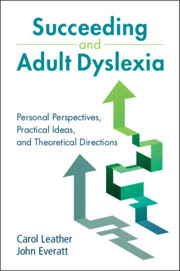Book contents
- Succeeding and Adult Dyslexia
- Succeeding and Adult Dyslexia
- Copyright page
- Contents
- Figures
- Tables
- Acknowledgements
- Part I
- Part II
- 4 Strategies Contributing to Success
- 5 Literacy and Language Issues and Strategies
- 6 Effective Communication
- 7 Dyslexia in the Workplace
- 8 Organisational Influences on Success
- 9 Personal Perspectives of Dyslexia and Career Success
- 10 Summary and Conclusions
- References
- Index
5 - Literacy and Language Issues and Strategies
from Part II
Published online by Cambridge University Press: 11 January 2024
- Succeeding and Adult Dyslexia
- Succeeding and Adult Dyslexia
- Copyright page
- Contents
- Figures
- Tables
- Acknowledgements
- Part I
- Part II
- 4 Strategies Contributing to Success
- 5 Literacy and Language Issues and Strategies
- 6 Effective Communication
- 7 Dyslexia in the Workplace
- 8 Organisational Influences on Success
- 9 Personal Perspectives of Dyslexia and Career Success
- 10 Summary and Conclusions
- References
- Index
Summary
Chapter 5 explores the impact of dyslexia on effective language processing. It explains some of the literacy processes that are assessed during a dyslexia diagnosis, as outlined in chapter 2. Such an understanding has been indicated as useful by many of the adult dyslexic contributors to this book. Greater awareness of the complexity of reading/writing has decreased their frustration, as well as improved their literacy skills and confidence. Therefore, the chapter will focus on developing an understanding of the processes and strategies that support improving literacy skills at the word and text level, and which can further development basic language skills involved in processing sounds and meaning/vocabulary. The chapter provides a range of suggestions, tasks/activities and strategies to improve these underlying reading and language processes. The chapter also covers how to work with text and strategies for improved comprehension as this is the focus of reading for adults, and which may be a particular area of difficulty for many if reading at speed is emphasised. The chapter ends with exploring some the technological solutions that can support reading and writing.
Keywords
- Type
- Chapter
- Information
- Succeeding and Adult DyslexiaPersonal Perspectives, Practical Ideas, and Theoretical Directions, pp. 138 - 167Publisher: Cambridge University PressPrint publication year: 2024



